Diplomatic Bluebook 2020
Chapter 2
Japan's Foreign Policy that Takes a Panoramic Perspective of the World Map
3 LAC Countries (See 2 (3) Above for Caribbean Countries)
(1) Mexico
Approximately 1,200 Japanese companies operate in Mexico, making it the biggest economic base for Japan in the LAC region. President López Obrador, who was inaugurated in December 2018, is advancing an administration that focuses on domestic affairs, and maintains an approximately 70% approval rating one year after his inauguration. On the other hand, he has not visited foreign countries since becoming president as he promised during the election period. In addition, the Senate approved both the United States-Mexico-Canada Agreement (USMCA) in June 2019 as well as the Protocol of Amendment in December ahead of the U.S. and Canada. The USMCA could affect the activities of Japanese companies operating in Mexico, and attention is focused on the timing when the legislatures of the U.S. and Canada approve the USMCA, as well as the implementation of the agreement following its entry into force.
As for relations with the U.S., due to the surge of undocumented immigrants entering the U.S. through Mexico, the Trump administration announced at the end of May that it would impose tariffs on all imported goods from Mexico unless the situation improved. However, as a result of consultations between the administrations of both countries, the U.S. suspended levying tariffs. Mexico is implementing immigration measures within the country based on the joint statement issued on that occasion.
In 2019, the first Japan-Mexico Foreign Ministers' Meeting under the López Obrador administration was held between Foreign Minister Kono and Foreign Minister Ebrard, who was attending the G20 Osaka Summit on behalf of President López Obrador. Both ministers agreed to further strengthen bilateral relations.
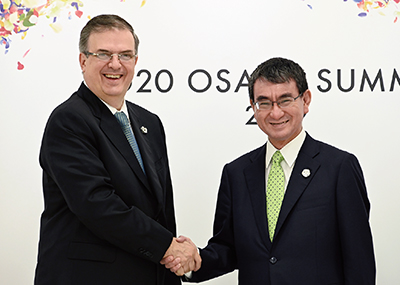 Japan-Mexico Foreign Ministers' Meeting (June 29, Osaka)
Japan-Mexico Foreign Ministers' Meeting (June 29, Osaka)(2) Central America (El Salvador, Guatemala, Costa Rica, Dominican Republic, Nicaragua, Panama, Belize, and Honduras)
El Salvador, Guatemala, and Honduras have concluded respective agreements concerning cooperation on immigration with the Trump administration, which places importance on measures to stop illegal immigration. Through these agreements, it became possible for the U.S. to transfer immigrants taken into custody within the U.S. to these three countries.
Japan supports efforts to establish democracy in Central American countries, and dispatched personnel to the Electoral Observation Mission of the Organization of American States (OAS) during the presidential elections in Guatemala in June and August. In addition, Japan is strengthening relations with Central American countries through the Central American Integration System (SICA) with a focus on support for regional integration and development cooperation with countries in the region.
(3) Cuba
The new constitution was promulgated in April, and President Díaz-Canel and Prime Minister Marrero were respectively elected in October and December, building the new system under the new constitution. On the other hand, socialism and the single-party leadership system under the Communist Party continued, and no major changes can be seen in government administration and policy direction. Relations with the U.S., attracting foreign investment, and fostering domestic industries will continue to be challenges. 2019 was the 90th anniversary of diplomatic relations between Japan and Cuba, and in commemoration of that, mutual visits of dignitaries were made, including the visits to Cuba by Special Envoy to the Prime Minister Furuya Keiji (member of the House of Representatives) and Parliamentary Vice-Minister for Foreign Affairs Tsuji Kiyoto, and many events were held in both countries.
(4) Brazil
Following the formation of his administration, President Bolsonaro, who was inaugurated in January, began to implement various policies, including streamlining government organizations, which he raised as campaign promises. As part of these efforts, he submitted a bill to the Congress of the Union to reform the pension system and eliminate the budget deficit, which was passed in October. The direction of economic reform has led to a favorable market perception, and Brazil's stock market set a new record. In terms of foreign policy, Brazil has shifted its policy of placing importance on relations with developing countries under the Worker's Party that had continued since the 2000s, and now places importance on strengthening relations with developed countries such as Japan and the U.S.
In terms of relations with Japan, immediately following the inauguration of President Bolsonaro in January, a Japan-Brazil Summit Meeting was held on the margins of the World Economic Forum (Davos), and the two leaders agreed to further promote bilateral relations in a wide range of fields. In addition, President Bolsonaro visited Japan twice, in order to attend the G20 Osaka Summit in June and the Ceremony of the Enthronement of His Majesty the Emperor in October. Japan-Brazil Summit Meetings were held during his visits. Three summit meetings were held during the year, an unprecedented frequency in recent years, which attest to the strong bilateral relations between Japan and Brazil.
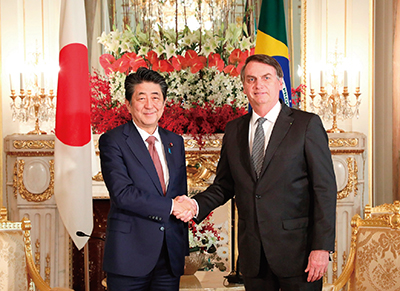 Japan-Brazil Summit Meeting
Japan-Brazil Summit Meeting (October 23, Tokyo; Photo: Cabinet Public Relations Office)
(5) Argentina
Although President Macri, who was inaugurated in 2015, promoted liberal economic reform, the economy did not change for the better and he was defeated during the presidential election in October 2019. The Fernández administration, which was inaugurated in December, criticized the previous administration's economic policies as being too liberal, and is advocating for equitable development and the protection of the vulnerable population.
In terms of relations with Japan, Prime Minister Abe held a summit meeting with President Macri when he attended the G20 Osaka Summit in June, and the two leaders agreed to strengthen bilateral relations.
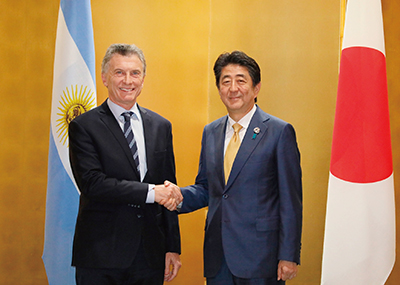 Japan-Argentina Summit Meeting
Japan-Argentina Summit Meeting (June 27, Osaka; Photo: Cabinet Public Relations Office)
(6) Peru
Under the Vizcarra administration, the Peruvian economy is maintaining firm growth. On the other hand, as President Vizcarra does not have a political base in Congress, he dissolved it in September in a context of conflict, and announced that an election for the members of Congress would be held in January 2020.
In terms of relations with Japan, a foreign ministers' meeting was held in May, where the two leaders confirmed that Japan and Peru are strategic partners that share universal values with over 140 years of diplomatic relations. The “Tax Convention between Japan and the Republic of Peru” was signed in November.
At the invitation of the Governments of Peru and Bolivia, Her Imperial Highness Princess Mako of Akishino visited the two countries from July 9 to 20 to attend the commemorative ceremonies marking the 120th anniversary of Japanese immigration to these countries.
Today, approximately 100,000 and 13,000 Nikkei people (Japanese immigrants and their descendants) are in Peru and Bolivia respectively. They are active and successful in every sphere of life in both countries.
On April 3, 1899, 790 Japanese nationals on board the “Sakura Maru” arrived at the Port of Callao in Peru, and settled in the country as contract workers in the agricultural sector. Of those 790 Japanese, 91 people who could not withstand the harsh environment of sugar cane fields crossed the border in September the same year to neighboring Bolivia, where they took up work in rubber plantations of San Antonio, north of La Paz. This was the start of Japanese migration to Bolivia.
Thereafter, as both Peru and Bolivia joined the Allied Powers in World War II, the Japanese nationals and Nikkei people living in the two countries suffered from many hardships throughout this period, such as prohibition of the use of the Japanese language, closure of Japanese schools, and freezing of their assets, until diplomatic relations between Japan and the two countries were restored in 1952. After the war, second- and third-generation Nikkei people in Peru adapted quickly to the Peruvian society through education in local schools, and gradually expanded their activities across a wide spectrum of Peruvian society. As for Bolivia, from 1954, Japanese migrants from Okinawa Prefecture, who had settled in Bolivia through financial assistance provided by the U.S. Government to the Government of the Ryukyu Islands at the time, established Colonia Okinawa. In addition, 1,684 people were resettled in Colonia San Juan as part of the systematic migration program implemented by the Government of Japan.
Today, Nikkei people in both countries have won the trust of the local governments and the peoples. They have taken on important roles in various fields, and serve as a bridge connecting Japan with the two countries.
In light of this historical background, during Her Imperial Highness Princess Mako of Akishino's visit to Peru and Bolivia in 2019, Her Imperial Highness visited the Japanese Peruvian Association (Asociación Peruano Japonesa) and other Nikkei-related facilities in Lima, the capital of Peru, as well as the Japanese Association in La Paz, the Santa Cruz Japanese Social Center, Colonia San Juan, and Colonia Okinawa in Bolivia, amongst other places. 2019 being a special year, members of the Nikkei communities in both countries worked with ardor on preparations for the commemorative ceremonies and other events for the 120th anniversary of Japanese immigration. During all these events, Her Imperial Highness interacted in a warm and friendly manner with members of the Nikkei communities, leaving everyone greatly moved by the experience.
Her Imperial Highness' visit to Peru and Bolivia during the milestone year of the 120th anniversary of Japanese immigration, was truly an opportune event that will further promote friendly relations between Japan and the two countries going forward, and establish strong bonds that can be passed on to future generations.
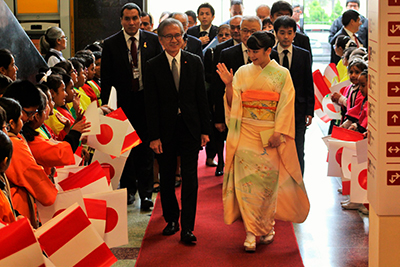 Her Imperial Highness Princess Mako of Akishino being welcomed at the venue of the commemorative ceremony for the 120th anniversary of Japanese immigration to Peru (July 10, Lima, Peru; Photo: Peru Shimpo)
Her Imperial Highness Princess Mako of Akishino being welcomed at the venue of the commemorative ceremony for the 120th anniversary of Japanese immigration to Peru (July 10, Lima, Peru; Photo: Peru Shimpo)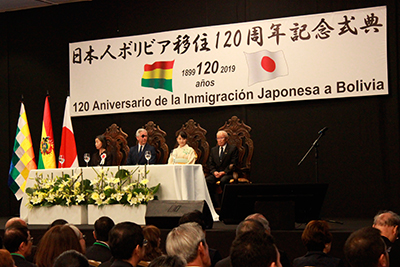 Her Imperial Highness Princess Mako of Akishino gracing the commemorative ceremony for the 120th anniversary of Japanese immigration to Bolivia (July 17, Santa Cruz, Bolivia)
Her Imperial Highness Princess Mako of Akishino gracing the commemorative ceremony for the 120th anniversary of Japanese immigration to Bolivia (July 17, Santa Cruz, Bolivia)(7) Chile
President Piñera has worked on education and pension reform improvements, placing importance on economic measures to spur economic growth. However, motivated by the raising of subway fares in October, anti-government activities increased that called for eliminating disparities, parts of which led to riots and clashes with security forces. Due to the effects of this, the APEC Economic Leaders' Meeting and APEC Ministerial Meeting as well as the 25th session of the Conference of the Parties to the United Nations Framework Convention on Climate Change (COP25) that were scheduled to be held in Chile were cancelled.
In terms of relations with Japan, in addition to President Piñera's visit to Japan in June to attend the G20 Osaka Summit as well as the Japan-Chile Summit Meeting held during the G7 Summit in Biarritz in August, a foreign ministers' meeting was held with Foreign Minister Ribera who visited Japan to attend the G20 Aichi-Nagoya Foreign Ministers' Meeting in November. On these occasions, close cooperation was confirmed toward strengthening bilateral relations and promoting free trade.
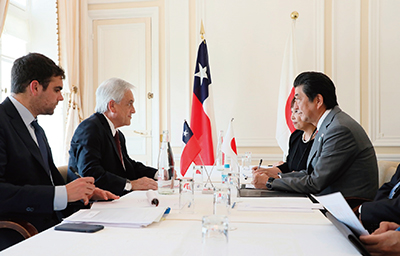 Japan-Chile Summit Meeting (August 25, Biarritz, France; Photo: Cabinet Public Relations Office)
Japan-Chile Summit Meeting (August 25, Biarritz, France; Photo: Cabinet Public Relations Office)(8) Uruguay
Taking into account that Prime Minister Abe made the first ever visit by a Japanese prime minister to Uruguay in December 2018, Japan and Uruguay mutually lifted bans on the other country's beef exports in February 2019. In addition, relations have grown closer in multifaceted ways in recent years, including signing the Tax Convention between Japan and Uruguay in September. The National Party, the opposition party, won the presidential election held in November, and candidate Lacalle Pou was elected to be the next president. President Lacalle Pou was inaugurated in March 2020, marking a change for the first time in 15 years from a leftist administration to a centrist administration.
(9) Paraguay
The Abdo Benítez administration is continuing to maintain its free and open economic policies. In 2019, commemorating the centenary of diplomatic relations between Japan and Paraguay, there were visits to Paraguay by Parliamentary Vice-Minister for Foreign Affairs Tsuji in March and Parliamentary Vice-Minister for Foreign Affairs Omi Asako in December, and Vice President Velázquez visited Japan to attend the Ceremony of the Enthronement of His Majesty the Emperor in October. Through these visits by dignitaries, bilateral relations were advanced further. (see the Column on page 110)
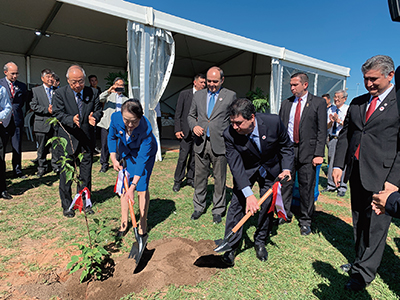 Parliamentary Vice-Minister for Foreign Affairs Omi planting a tree at the ceremony commemorating the 100th anniversary of the establishment of diplomatic relations between Japan and Paraguay (December 19, Paraguay)
Parliamentary Vice-Minister for Foreign Affairs Omi planting a tree at the ceremony commemorating the 100th anniversary of the establishment of diplomatic relations between Japan and Paraguay (December 19, Paraguay) The logo for the 100th anniversary of the establishment of diplomatic relations between Japan and Paraguay. Based on the motif of Paraguay's traditional lace embroidery craft Ñandutí, the logo embodies the interwoven history of the two countries, as well as the new future that they will weave going forward.
The logo for the 100th anniversary of the establishment of diplomatic relations between Japan and Paraguay. Based on the motif of Paraguay's traditional lace embroidery craft Ñandutí, the logo embodies the interwoven history of the two countries, as well as the new future that they will weave going forward.What are some of the things that come to mind when you hear about Paraguay? You may think of the legendary Paraguayan goalkeeper José Luis Chilavert, or the intense soccer matches between the Japanese team and the Paraguayan team in the 2010 FIFA World Cup.
Japan concluded a treaty of commerce with Paraguay in 1919, and in 2019, the two countries celebrated the centenary of their diplomatic relations.
Over the past century, Japan-Paraguay relations progressed significantly. In 1936, the first group of Japanese migrants settled in Paraguay and contributed greatly to the development of the country, particularly in the agricultural sector. Today, approximately 10,000 Nikkei people (Japanese immigrants and their descendants) continue to play an active role in the Paraguayan community. In the aftermath of the Great East Japan Earthquake, bean curd (tofu) made from 1 million tons of soybeans sent by the Japanese community of Paraguay was delivered to the disaster areas, bringing joy to those affected by the disaster. Moreover, Paraguay has continued to achieve robust economic growth in recent years under an open economic policy, and the number of Japanese companies expanding their businesses into the Paraguayan market has more than doubled over the past six years. In August 2019, a business mission to Paraguay from Keidanren (Japan Business Federation) and the Japan External Trade Organization (JETRO), among other initiatives, drew the attention of the Japanese business circles to Paraguay. Furthermore, Japan has, for many years, been providing “visible” support to Paraguay in aspects of economic cooperation, such as infrastructure development, human resource development, and cooperation through NGOs. Through these efforts, Paraguay has become one of the most prominent countries with great affinity toward Japan in Latin America. Against the backdrop of this close and friendly bilateral relationship, Vice President Velázquez and his wife attended the Ceremony of the Enthronement of His Majesty the Emperor at the Seiden and the Court Banquet after the Ceremony of the Enthronement held in October, and offered their congratulations and well wishes for the enthronement of His Majesty the Emperor.
In December 2018, ahead of the centenary, Prime Minister Abe visited Paraguay, marking the very first visit by a Prime Minister of Japan to the country. At the Summit Meeting with President Abdo Benítez, the two leaders agreed to further strengthen bilateral relations and promote cooperation in the international fora. They also announced and presented the logo for the 100th anniversary of diplomatic relations.
Then throughout 2019, many commemorative events were held in Japan and Paraguay. In Paraguay, starting with the 100th anniversary kickoff event (March) attended by then Parliamentary Vice-Minister for Foreign Affairs Tsuji Kiyoto, more than 60 commemorative events were held including public performances of Japanese court music, Japanese festivals, and Japanese drum (wadaiko) concerts. The commemorative events held in Japan included an exhibition of Ñandutí (a form of traditional embroidery from Paraguay), performances of the Paraguayan harp (arpa), and classical guitar concerts. These commemorative events provided opportunities for citizens from both countries to gain exposure to their respective cultures, have fun, and deepen mutual understanding. In December, a commemorative ceremony, attended by Parliamentary Vice-Minister for Foreign Affairs Omi Asako, was held in Paraguay as the finale to the 100th anniversary events, bringing the year-long anniversary project to a close.
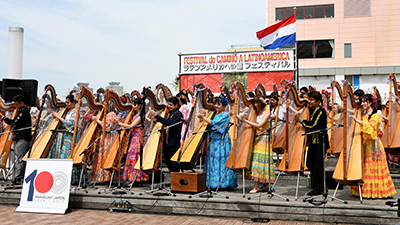 Scene at a cultural event in Japan (May 3, Tokyo Photo: Embassy of the Republic of Paraguay in Japan)
Scene at a cultural event in Japan (May 3, Tokyo Photo: Embassy of the Republic of Paraguay in Japan)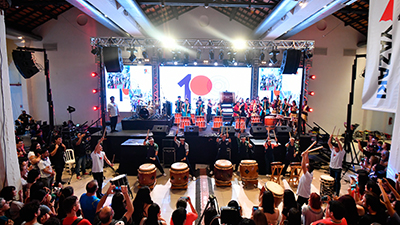 Scene of Japanese festival in Paraguay (November 9, Asunción, Paraguay)
Scene of Japanese festival in Paraguay (November 9, Asunción, Paraguay)Japan and Paraguay are far from each other geographically, but are important partners that share the universal values of liberty, democracy, human rights, and the rule of law. Looking ahead to the next 100 years, the two countries will continue to further deepen the bonds that were strengthened during the celebratory year of the centennial across a wide range of fields including politics, economy, culture, and people-to-people exchanges.
(10) Colombia
President Duque, who was inaugurated in August 2018, is working on social reintegration while aiming to partially revise the peace agreement in Colombia.3 In addition, 2019 marked the 90th anniversary of Japanese immigration to Colombia. A commemorative ceremony was held in October in the city of Santiago de Cali, which was attended by Parliamentary Vice-Minister for Foreign Affairs Omi on behalf of the Government of Japan. Foreign Minister Trujillo visited Japan in October to attend the Ceremony of the Enthronement of His Majesty the Emperor, and a foreign ministers' meeting was held.
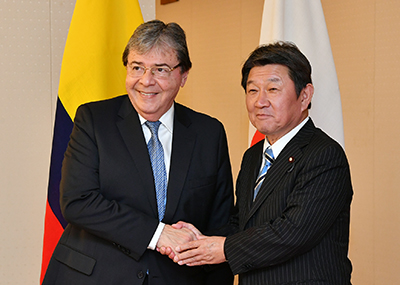 Japan-Colombia Foreign Ministers' Meeting (October 21, Tokyo)
Japan-Colombia Foreign Ministers' Meeting (October 21, Tokyo)- 3 Then-President Santos started the peace talks with the Revolutionary Armed Forces of Colombia (FARC), the largest guerilla organization in Colombia, in 2012 in order to end the domestic strife that had lasted for over half a century. The peace agreement was announced in 2016.
(11) Venezuela
The inauguration ceremony for President Maduro was held in January 2019 amidst doubts about the legitimacy of the presidential election held in May 2018. During the same month, the President of the National Assembly Guaidó (opposition party) was sworn in as Interim President based on the provisions of the constitution, which intensified conflict between the administration and the opposition party. In addition, many Venezuelans flowed into neighboring countries as refugees and migrants due to effects such as hyperinflation. Receiving them has become a regional challenge. Japan supports Interim President Guaidó, calling for a free and fair presidential election to be expeditiously held, and is providing support to the people in Venezuela including refugees, as well as affected neighboring countries, such as Colombia.
(12) Bolivia
During the presidential election held in October, protests intensified due to suspicions of election fraud by the incumbent President Morales. After President Morales announced his resignation in November and sought exile abroad, the Second Vice President of the Senate Áñez assumed the post of Interim President. Another presidential election is scheduled to be held in 2020 under Interim President Áñez.
(13) Ecuador
Liberalization of the economy is progressing under President Moreno. Due to the elimination of gasoline subsidies as budget cut measures, anti-government activities occurred throughout Ecuador in October, but have wound down as of the end of 2019. In terms of relations with Japan, Foreign Minister Valencia visited Japan to attend the Ceremony of the Enthronement of His Majesty the Emperor in October.
(14) Collaboration with Nikkei Communities
The Nikkei community has fostered a sense of affinity toward Japan in LAC countries. Nevertheless, generations have transitioned over 100 years since Japanese immigration to LAC began, and the younger generation with relatively little connection to Japan is growing in number. Amid this situation, in addition to inviting young Nikkei people to visit Japan, Japan also implements measures toward strengthening cooperation with Nikkei communities, including providing support for holding events by young Nikkei people in various countries and support for creating networks among young Nikkei people. Furthermore, Japan is working on cooperation with Nikkei communities that transcends national borders, including dispatching the Ambassador for Cooperation with Central and South American Nikkei Communities to attend the Convention of Pan American Nikkei (COPANI) held in San Francisco in the U.S. in September, and holding exchanges of views with Central and South American Nikkei participants.
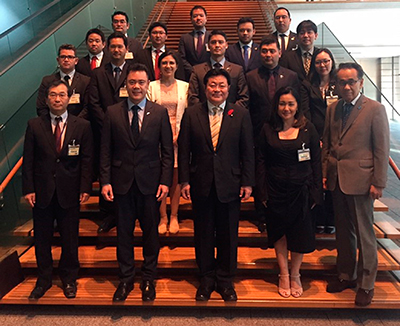 Courtesy call to Deputy Chief Cabinet Secretary Nishimura Akihiro by a delegation of Next Leaders of Nikkei Communities in Latin America and the Caribbean (October 4, Tokyo)
Courtesy call to Deputy Chief Cabinet Secretary Nishimura Akihiro by a delegation of Next Leaders of Nikkei Communities in Latin America and the Caribbean (October 4, Tokyo)

